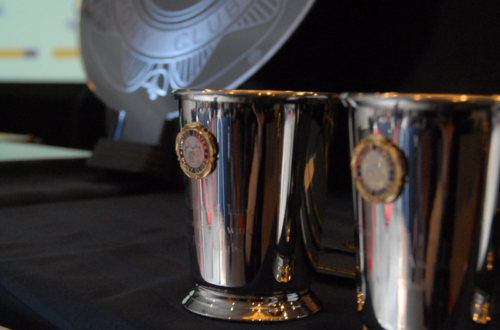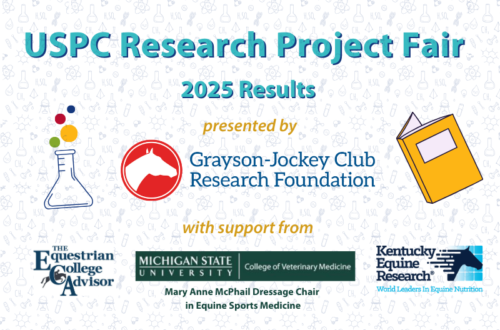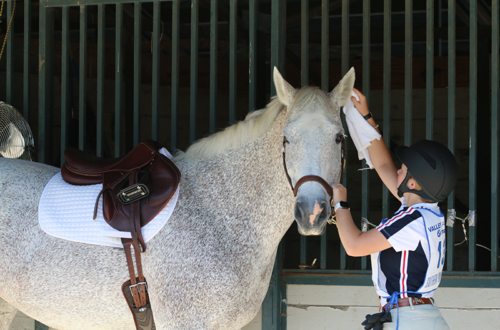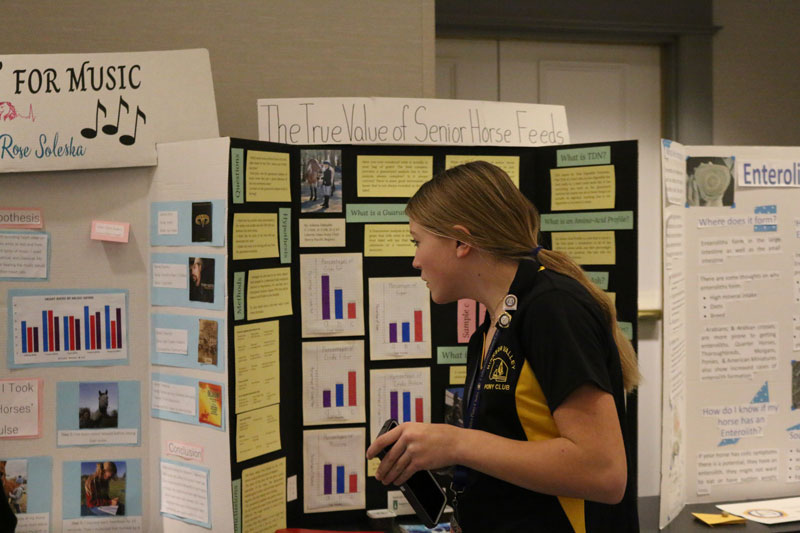
Tips for the USPC Research Project Fair
By Liz Moyer, USPC Fundraising & Marketing Coordinator
Are you that person who reads everything about horses that you can find? Perhaps you are the one at the barn who always has a million questions at Pony Club meetings for your instructor, the farrier, the vet, or any other equine expert that may cross your path. If you always want to know more when it comes to horses, you might also want to know more about Pony Club’s Research Project Fair.
Held in January each year with the USPC Convention, the USPC Research Project Fair is an opportunity for Pony Club members of all ages and certification levels to further their knowledge on equine and riding-related topics. It’s also a great way to prepare for certifications, and it offers many additional benefits in developing research and public speaking skills.
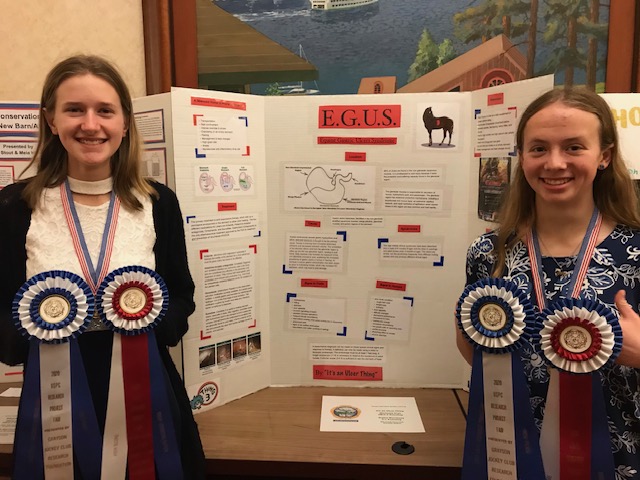
Benefits of Participating in the Research Project Fair
“The RPF is a fantastic opportunity to dig deeper into a topic of interest and gain presentation skills in an encouraging environment,” says Lisa Morrissey, Regional Supervisor of the Midwest Region. “Midwest Region has had members of many different ages and personalities participate, and every time, they are very glad they chose to do it.”
Morrissey has logged a decade of experience with the Research Project Fair as both a leader and a parent and encourages members from her region to participate every year. Not only has the Midwest Region always been well represented; but Morrissey’s daughter Alaina did 11 projects in 10 years!
Alaina Morrissey (C-2 HM, C-2 EV, C-2 HSE, of Hinkson Valley Pony Club), loves the Research Project Fair and tries to encourage everyone in her club to try it at least once.
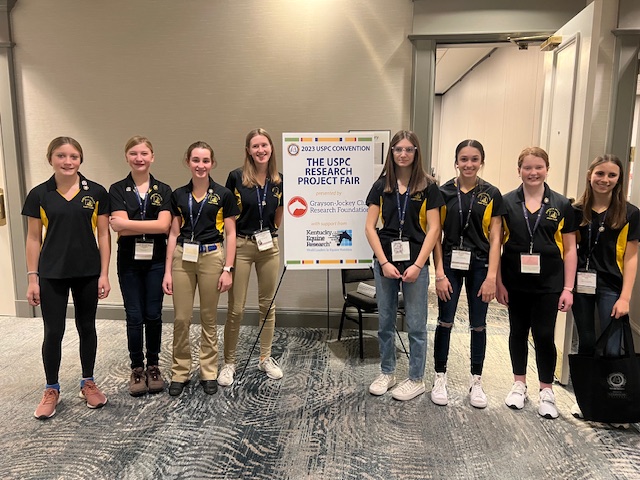
“It is an amazing way to gain experience doing research, speaking in front of a group of judges, and working on a long-term project,” she says. “I am currently in my first year of college, and I have been able to find resources for papers and give presentations more easily than my peers. I struggle with anxiety, particularly with speaking in front of others, but the Research Project Fair allowed me to learn how to manage that anxiety in a safe space. I have given individual and group presentations, and either way, there is always a plethora of support, both from the other presenters and those who came to watch.”
Michaela Frye (H-B HM, C-3 EV, of both Mill Creek Pony Club and Hinkson Valley Pony Club) has been participating in the Research Project Fair for about six or seven years and enjoys it for many reasons.
“The Research Project Fair is a great opportunity to research specific elements of horses that interest you,” she says. “I hope to be a veterinarian one day, and I have enjoyed researching disorders in horses, as well as scientific advancements in equine veterinary research. I feel as though my different projects have made me a more well-rounded Pony Club member. Over the years, my topics have gotten progressively more in-depth and complicated. For example, my second literature review was about the different Triple Crown winners, and one of my most recent literature reviews was about pacemaker implantation in horses.
“In addition to learning more about equine science and anatomy, it has also helped me in non-horse related things,” she continues. “For example, I am currently taking a college-level public speaking class, and the experience I have from giving Research Project Fair presentations has been a tremendous help.”
Michaela reports that she has also gained many friends through the Research Project Fair, including Alaina Morrissey, whom she counts as one of her closest friends, as well as a friendly rival when it comes to Research Project Fair competition!
Five Things to Know About the Research Project Fair
If you’re curious about giving the Research Project Fair a try, here are Lisa’s top things to know about the USPC Research Project Fair:
- You do not have to do a scientific, research-based experiment. “Many members do, and I’ve been blown away by some of the topics and amazing presentations, but there are other ways to participate,” shares Lisa. “Members can also do literature reviews on any equine-related topic they would like to know more about. They can also work with others in a small group if they wish or do an individual presentation. Some members do both!”
- You will be judged based on your age group and certification. An 8-year-old D-1 can have a fantastic presentation just as well as an 18-year-old H-B. The judges gauge their scoring and discussion based on the age and certification level of the presenter.
“I have watched the Research Project Fair for 10 years, and I can attest that the judges are consistently encouraging, interested, and make sure the member finishes with a positive experience,” says Lisa. - Don’t fear the presentation. There’s no need to worry about memorizing everything. You are welcome to have note cards and to use your display poster to help you stay on track as you present.
- You do not have to be present at the convention to participate. For several years now, the Research Project Fair has had both in-person and online options. Online participants present via Zoom to the panel of judges and receive prizes through the mail.
- Parents and leaders can help the process. In addition to speaking to their club or center members about the Research Project Fair and encouraging participation, Lisa says there are a few things parents and leaders can do to help preparations go smoothly.
“Make time for members to form groups or brainstorm topics,” she says. Lisa also advises getting entries in early and starting the research as soon as possible so that participants aren’t stressed. She finds that making time during an early Quiz practice is a great way for members to present their topic. “This will help them practice for the Research Project Fair, and everyone will learn something,” she says.
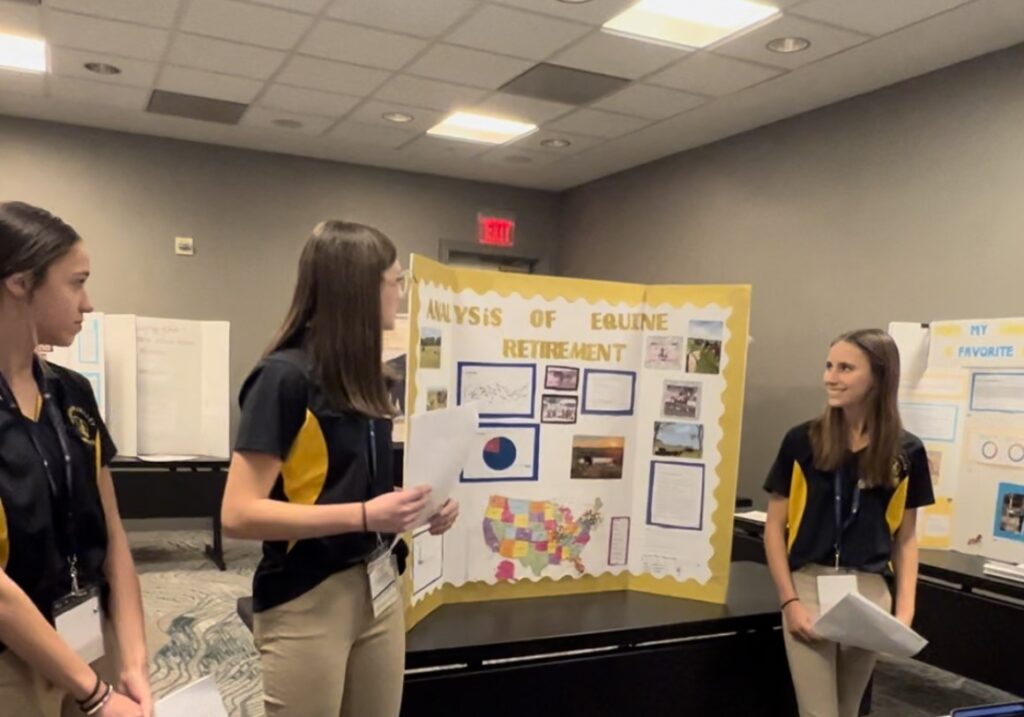
Topics of Interest
The first step to success in the Research Project Fair is choosing a topic. “The range of topics for literature reviews and research-based experiments is so broad!” says Lisa. Any topic that you find in the USPC Manuals of Horsemanship or that a member has an interest in can be made into a Research Project Fair presentation.
Here she shares some of the topics that have stood out to her over the years, including:
- Tow vehicles and trailers—This was a fantastic review of the capabilities of various pulling vehicles and what size of trailer is appropriate for them.
- Equine genetics
- Stable design
- Fire safety
- Equine euthanasia—This was by a high school member who plans to attend veterinary school.
- Tests of various kinds of bedding for absorbency, comfort, dust etc.
- Tests of various breeches for grip on the saddle
- A review of installing a water collection system on a stable
- Equine pacemakers
- An experiment to see what type of treats various ponies preferred
- Equine retirement facilities across the country—This group surveyed many facilities and compiled data about them
- Equine narcolepsy
- Club foot—This member owned a pony with a club foot, so they used this opportunity to learn more about him.
- Reviews of various breeds
- Data on bacteria levels in swabs of the mouth, hoof, and skin
- Analysis of various commercial feeds
However, Lisa’s best advice is to “find a topic that interests you or relates to what you and your mount are experiencing. This will make it much more fun to research.”
Alaina agrees with choosing a project that interests you and that you can connect with personally.
“My most recent topic was equine cancer, which had taken two of my horses in the past year. The project served as a way to connect with them by better understanding what happened, as well as educating others on the warning signs of the most common forms of cancer in horses, and the best routes of treatment. I suggest picking a topic that you are excited about; the judges can tell when you are invested.”
Tips for a Successful Project and Presentation
Both Alaina and Michaela recommend speaking to a veterinarian if you are doing a health-related topic, whether it’s a literature review or an experimental project.
“In the past, my horses’ veterinarian has helped me further understand my topics,” says Micaela. “She has also helped me decide on what topic to research, and she has given me props to use, like a skull and a spinal needle.”
Also, remember to use your Pony Club resources, says Alaina. Your club likely has a library of books and information on various horse topics and can also be a great source of support, she says.
Many people get nervous about public speaking, but Alaina and Michaela both have tips to conquer those jitters.
“If you are worried about having to present your topic, practice presenting it to some friends, your parents, or other Pony Club members before the Research Project Fair. The more you practice, the more confident you will be,” advises Michaela. “I like to have some note cards when I present my projects, but if you go this route, make sure you don’t read your entire speech. Glance at your note cards occasionally and make sure to look at the judges. After you give the presentation, the judges will ask you some questions. My advice is to be confident in your answers. If you don’t know the answer to something, it is okay.”
Alaina adds her tips for dealing with nerves. “If you are nervous about presenting, it helps to have an emotional support person there, such as a friend or a parent, and I like to think about speaking in a yoga instructor voice to keep myself from talking too fast,” says Alaina. “Visual aids are an amazing addition to a presentation, and if you are able to incorporate them, they help engage the audience and make what you’re describing easier to understand.”
Lastly, Michaela reminds everyone to have fun with the Research Project Fair. “Choose a topic that you find interesting. If you’re nervous about presenting, do a group project. It makes it more fun and less scary to have a friend presenting a project with you. I did group projects my first four years competing in the Research Project Fair, and I didn’t start presenting individual projects until recently. Competing in the Research Project Fair requires effort and time, but it’s definitely worth it!”
Look for information here for future Research Project Fairs.



